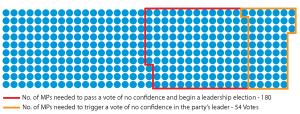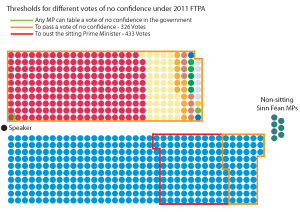It’s a question that I’ve been asking myself with increasing regularity in the past few days as I watch the endless line of Ministers and Parliamentarians bombarded over what should be an indefensible position. The Prime Minister lied – to Parliament, the media and the public and by any ordinary measure Boris Johnson should have left office the moment those images of him and his Cabinet in the Downing Street garden emerged. Yet here we are, months later, five different excuses from the Prime Minister and still there are those in power who would continue to defend him even to what is seemingly the point of their own self-destruction.
In the face of such kamikaze-like commitment we come back to that question of why Boris hasn’t resigned. Why are some Ministers still eager to defend him? Why does the Prime Minister feel comfortable goading the opposition into a vote of no confidence that could result in the end of his tenure?
I can think of only two answers – either the Prime Minister, his Cabinet and every single other defender of Boris is an idiot, or there is something they are aware of that we aren’t. Of course stupidity should never be ruled out of any strategic analysis of politics, as 9 times out of 10 stupidity is the case. Still, there is no harm in digging a bit deeper to see if there is anything behind this latest catalogue of buffoonery.
It’s a personal interest of mine that led me to conduct an investigation into the procedure involved in dealing with a Prime Minister that refuses to resign and, speaking truthfully, if it isn’t handled properly, this situation could well spiral out of control and result in the end of Britain’s democracy.
Staring with what most people are familiar with – in the case of a No-Confidence Vote in the Prime Minister or Government the procedure is as follows: 15% of MP’s must first submit a letter of complaint to the 1922 Committee, a group of backbench Conservative MP’s who meet weekly to discuss various issues, including confidence in the leader of the party. Each party uses their own process and threshold to determine a leadership challenge. Still, only the Conservative Party’s process is relevant for the moment so I’ll be focusing on that.
At the moment 15% translates into 54 MP’s and once that threshold is crossed a leadership contest is open in which a secret ballot will be held within the party to determine whether it still has confidence in its leader. Boris Johnson however has assured the media that this is just a ‘hypothetical’ scenario and that “everyone should wait for the results of the Sue Grey inquiry”. Well, in a ‘hypothetical’ scenario where the threshold was reached, the actual process of a no-confidence vote would begin, in which 180 MP’s would have to go against the Prime Minister – that is, over half of the party.
Illustration of Votes Needed:

This is a tall order to say the least, even in light of all the public displeasure with Boris, but this was the same assumption Margaret Thatcher made in 1990 when she faced a no-confidence vote that brought her political career to a very abrupt end. Even still we shouldn’t see this as the end for Johnson, for that 180 takes a lot of effort and pressure from MPs and the media alike to reach, which is why others in Parliament may take something more away from this vote if it even occurs.
The current vote that Boris is focused on is solely within his own party, which isn’t open to the other members of Parliament. However, suppose the Opposition proposed a Vote of No Confidence and threw their numbers into the ring. In that case, the combined votes of the Tory Rebels and the Opposition Parties may be enough to pass the motion. Johnson can afford 179 votes against him in a vote concerning his own party; but in one open to all of Parliament it would only take just 47 Conservative votes to end him, assuming that all the other opposition parties vote against him.
In fact that’s the strange thing about this whole process, all of it is based upon assumptions. The calls for resignation by MPs, the media plastering of his defenders and the public outcry at Boris’s actions are all meaningless because the terrifying thing about our system of government is that the Prime Minister never has to resign. There have always been practices and taboos of the constitution in which it was expected you would resign if you violated them but there is nothing in British law that explicitly states that a Prime Minister must resign under any circumstance.
After all isn’t that what Boris Johnson has proven over the past weeks? He broke the very lockdown rules he created, yet he didn’t resign. He blatantly lied to Parliament, the people’s representatives, yet he didn’t resign. He even faces the Metropolitan Police interviewing members of his own party on accusations of intimidation and blackmail by his subordinates, yet he still hasn’t resigned.
I’d like to believe Johnson is surrounded by democratically minded individuals who to some degree appreciate the significance of his reckless actions, but what is undoubtedly clear is that he does not. He has shown that he believes himself to be a maverick in the mould of Winston Churchill, instead of actually acknowledging his role in destroying the very system his hero sought to protect. His dismissing of calls for him to resign and taunts from the Opposition just play into his personal and his allies’ fantasy that this is just another day in British politics.
Allow me to give them a quick reality check – they are pushing our political system not just to a constitutional crisis, but to outright collapse. It is not these idiots that concern me, it is those men with evil intent that will look upon what the Prime Minister has done and say, “I was only following his fine example”. Boris Johnson has broken the practical safeguards of Britain’s democracy one after another, leaving only the built-in checks to resist any future threats.
In all seriousness, Johnson may jokingly refuse resign in a back and forth with the Opposition, but what if he refuses to resign in the face of a no-confidence vote? His own party can refuse to cooperate on legislation, but he and his Ministers would still retain all the powers of the Prime Ministerial Office, including policing, defence, foreign and domestic policy.
In fact there are only three ways of sacking a Prime Minister if he refuses to resign.

The first and the most obvious is to have Parliament enact what is called an ‘Explicit Motion of No Confidence’ which if passed removes the subject’s status as an MP, and by association any public offices they hold. However, whereas before it would have just taken a simple change in wording (thanks to the ‘Fixed Term Parliament Act of 2011’ (FTPA)), the rules of the game have been changed. Instead of requiring a simple majority of 50% plus one in order for Parliament to remove one of its own members, it now needs over two thirds of the House to agree – that is 433 votes out of 650.
Obviously looking at the FTPA the need to remove a Prime Minister from office was a foreseen circumstance. However, I cannot say whether the authors of the bill (Nick Clegg and Jim Wallace) intended it to safeguard Britain’s democracy or a be tool of minority parties to gain more power in the Commons. Regardless, so long as Johnson holds on to 218 MPs he can remain in power indefinitely, all thanks to this piece of legislation.
So we are left with only two other options:
a) A General Election where Boris Johnson could be voted out. Aside from those in his constituency, the electorate can’t deprive Boris of power without voting out the Conservative party, which may not be a problem for most, but it will be a tough decision for those who like their local Conservative MP. Besides, once again thanks to the FTPA, the next Election is not due until May 2024 which is over two years away and, considering the increasingly chaotic state of the Johnson administration, it may be too dangerous to wait that long.
b) The last line of defence is her majesty Queen Elizabeth II. She is the only individual in the entire British government empowered to dismiss the government and the Prime Minister. Of course as we all know, the monarchy has always sought to remain above politics, if not for the better then certainly for its own survival. Still, if Boris refuses to resign and the Opposition can’t get the numbers to remove him, the Queen may be forced to break the deadlock.
This would be a truly unique moment of history as the last time such powers were used was in 1834 when William IV dismissed the Melbourne administration. However this fact is what makes it all the more unlikely to happen as Her Majesty isn’t prone to setting new precedents of the constitution. Although there is another reason why she might wish to take action (besides the insult of Boris and his Ministers partying on the night before her husband’s funeral, and refusing any family attendees) – a failure to act now may reap disaster in the future.
The public desire for accountability is real. NHS staff protesting outside No.10 and even the Military refusing to follow orders by Johnson to repel migrants of the channel are significant warning signs that there is more than meets the eye to the public mood – and why wouldn’t there be? People have died during the Covid-19 pandemic and while this fact may be considered obvious, the emotional impact that this has had on the populace is not. They are angry, and not just filled rage against the status quo – they have lost loved ones and want to know why.
So when the Prime Minister and his Cabinet act foolishly, it only antagonises people and creates a desire for justice that any demagogue could easily manipulate to their own destructive ends. This is the real danger of Johnson’s deluded belief that he can carry on as normal and break the very system that might remedy this situation. Our constitution assumes an individual will resign not out of noble duty but out of self-interest, for such an action satisfies the public’s demands for accountability whilst still maintaining the system’s structural integrity and, by association, the peace of the Kingdom.
Boris Johnson may well survive any no-confidence vote and Sue Gray’s inquiry may also exonerate him, but no one should assume that the county could be taken for fools. The Conservatives in all likelihood will fail to oust Johnson but if Kier Starmer or Ian Blackford were to then stand up and put the blame on the Conservatives when they have the power to act, they would be just as complicit in the corruption, as would anyone else for that matter.
Now is a time for action as words are no longer believed. If our democracy is to survive it must prove to be stronger than any one man. For if not…well…actions have consequences and we may all end up learning that lesson the hard way.
William Kelly is the founder of www.agorawales.com



